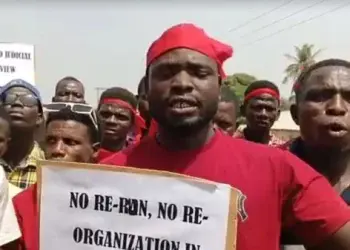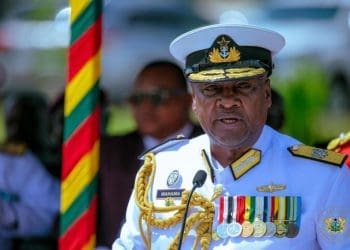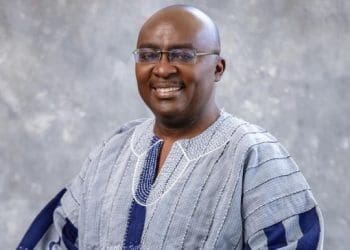Ten years after Ghana’s worst peacetime disaster claimed more than 150 lives in Accra, the OneGhana Movement is once again demanding justice and full compensation for survivors and victims’ families of the June 3 fire and flood tragedy.
Marking the 10th anniversary of the catastrophe at the Kwame Nkrumah Interchange GOIL fuel station—ground zero of the disaster—the movement called on the Government of Ghana and responsible institutions to take immediate action to deliver justice.
At the commemorative event on Tuesday, Senyo Hosi, leader of the OneGhana Movement, said the failure of the state to hold anyone accountable after a decade is both shameful and painful.
“Ten years on, no one has been held responsible. No institution has taken full blame. Survivors have been left to carry the trauma and cost of rebuilding their lives. This is a profound national failure,” he said.
“We are here not just to remember the dead but to demand justice that has long been denied.”
The Movement has over the years championed accountability and pursued a class-action lawsuit on behalf of victims against the Ghana Oil Company (GOIL), the National Petroleum Authority (NPA), and the Accra Metropolitan Assembly (AMA), which they argue contributed through regulatory negligence and poor planning to the disaster.
Class action lawsuit still pending
In 2018, a class-action lawsuit was filed on behalf of 69 survivors representing over 100 victims.
According to their legal counsel, Sampson Lardi, the plaintiffs are seeking GH¢42 million in damages, an amount that—due to inflation—represents only a fraction of the value lost.
“These individuals deserve more than a court ruling. They deserve real compensation, state support, and long-term care. This was a failure of institutions, not just an act of nature,” Lardi stated.
“Even if the courts award them this sum, the government can—and must—step in to provide meaningful redress.”
He called on the judiciary to expedite the case, which has been dragging through Ghana’s legal system for years with little progress.
Survivors speak
As the nation marked the tragic anniversary, survivors once again relived the trauma of that fateful night.
Survivors gave deeply personal and haunting accounts of the disaster.
One man, speaking through tears, recalled how the floods snatched away everything.
“It was a sad day for me. I lost my wife and child. It’s only by God’s grace that I’m still alive. The government should take care of the injured and the victims. We haven’t seen any help since the initial hospital bills were paid,” he lamented.
Another survivor, who suffered burns across his body, said he was simply at the fuel station to top up his tank when the explosion occurred.
“My life changed in seconds. The scars are permanent. The pain is constant. We need more than remembrance—we need support.”
Kafui Adzah, who narrowly escaped death with her daughter, recalled how she was rescued by a friend, Larry Dogbe, who swam through floodwaters to save them.
“He said, ‘If saving you and your daughter is the last thing I do, I will do it.’ Without him, I would have died. He was my angel, my hero,” she said.
The emotional scars remain. “Ten years later, I still get panic attacks when it rains. My daughter has nightmares. The government has not followed up. We’ve been abandoned.”
The sky turned orange
Akosua Ogyiri, who was working at Charterhouse when the floodwaters came, described the sheer terror of being trapped.
“We waited out the rain, but then water started rushing into our office. The lights went out. Then we smelled petrol. We knew something terrible was happening outside.


Minutes later, the explosion lit up the sky. It turned orange,” she recounted.
Though she and her colleagues were eventually rescued, the psychological trauma has never fully healed.
She expressed frustration over the country’s tendency to respond to disasters with short-lived outrage and no structural reform.
“We can’t keep waiting for people to die before we act. The true motivation for change must be rooted in a sense of civic duty—not in catastrophe,” she said.
A catastrophe born of neglect
On the night of June 3, 2015, heavy rainfall flooded major roads and gutters in Accra.
At the Kwame Nkrumah Circle, floodwaters submerged a GOIL fuel station, where dozens of people had sought shelter.
When fuel leaked from the submerged tanks and mixed with the water, a fire—allegedly sparked by a cigarette—triggered a massive explosion.
The fireball engulfed the station and surrounding vehicles, incinerating many people and trapping others in the floodwaters. It was a perfect storm of poor drainage systems, weak city planning, and negligent enforcement of safety standards.
Ten years on, many of the root causes remain unaddressed.
Open drains, illegal dumping of refuse, haphazard zoning, and institutional neglect continue to pose a threat to public safety in Ghana’s urban centres.
A nation’s moral test
The June 3 disaster is more than a tragic memory—it is a litmus test of Ghana’s national conscience.
Has the nation learned? Have institutions reformed? Has justice been served?
For the OneGhana Movement, the answer is no.
“Each year we gather here, not just in mourning, but in protest,” said Senyo Hosi.
“We will not stop until justice is done. The lives lost deserve that much. The survivors deserve that much. And the nation needs that much—if we are to avoid repeating this horror.”
Civic responsibility must endure
As Ghana reflects on the tenth anniversary of the disaster, survivors and civil society groups are demanding that the commemoration be more than symbolic.
Akosua Ogyiri said it best: “We don’t want pity. We want policy. We want to see the kind of change that protects lives—not after they’ve been lost, but before.”
The question now is whether Ghana will finally listen.












